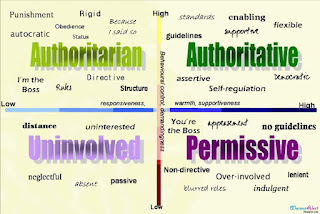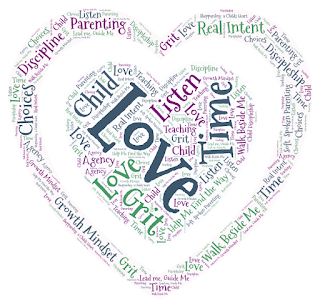Parenting Styles
What are parenting styles? A parenting style is a pattern of attitudes, ideas, behaviors, and approaches a parent uses when interacting with and raising their children.
What are the 4 parenting styles?
The four parenting styles are authoritative, authoritarian, permissive, and uninvolved. Diana Baumrind identified the first three parenting styles, while Dleanor Macoby and John Martin added the fourth one after further research (Cherry, 2022). Each of these styles of parenting affects children's behavior differently. Developmental psychologists have been interested in the cause-and-effect relationship of how parents' parenting styles affect how their children turn out. Some parenting styles are better than others.
1. Authoritarian (My way or the highway, or Because I said so)
Characteristics of an authoritarian parenting style include:
- Children are expected to follow strict rules set by parents.
- Parents do not explain the reasoning behind the rules but expect them to be followed with exact obedience. When a child asks why they need to do something, this type of parent may respond, "Because I said so"
- Intense criticism of children
- Low parental responsiveness
- Little consideration for the children's feelings
- A strained insecure parent-child relationship
Effects of authoritarian parenting:
Authoritarian parents place high demands on obedience and good behavior; they expect kids to obey without question., and to adhere to parental judgment and values. This limits the children's ability to form judgments and make decisions on their own. Children may struggle with mental health issues and expressing and managing emotions.
2. Authoritative Parenting ( Lead me, Guide me Walk Beside me approach)
Lead me, guide me, walk beside me, help me find the way, teach me all that I must do.....(I am a Child of God, Children hymnbook, pg. 2)
When I think of authoritarian parenting, I think of a parent taking a child by the hand and guiding them through life until they are ready to set out on their own.
Characteristics of an authoritative parenting style include:
- Provides consistent rules and expectations
- Encourages children's independence
- High parental demand and responsiveness
- Provides a warm, nurturing environment
- Sets firm limits and boundaries
- Willing to listen to their children's viewpoints when explaining decisions
- Encourages independence
- Creates an emotionally safe environment
- Encourages self-reliance
- provides reasoning and guidance for decisions and expectations
Effects of Authoritative Parenting:
Authoritative parents foster secure attachments with their children; through being supportive and nurturing, they encourage self-reliance and a sense of responsibility. These children experience better mental health, have higher self-esteem, have healthier relationships with others, and achieve higher academic success.
3. Permissive Parenting (Indulgent Parenting)
Characteristics of a permissive parenting style include:
- Social and emotional needs are valued
- Practice high parental responsiveness with low demandingness
- Supportive and attuned to their children's emotional needs
- Parent-child relationships are emotionally secure and safe
- Open Communication
- Children are allowed to make their own decisions
- Expectations are rarely set or enforced
- Place children's emotions and happiness above all else
- Struggle to set and keep boundaries
- Provide little guidance on how to behave socially
Effects of Permissive Parenting:
Permissive parents are kind and loving toward their children. They attend to their needs, which helps to form strong bonds and attachments. They do their children a disservice by providing little discipline and behavior guidance. Indulgent parenting creates future problems; the children may become self-centered, have low self-esteem, depend on their parents, behave impulsively, and have emotional and behavioral issues.
4. Uninvolved Parenting (distracted, disengaged, too busy)
Characteristics of uninvolved parenting include"
- Both low demandingness and low responsiveness
- Indifferent
- Does not address emotional needs
- Does not set behavioral or academic expectations
- Children's emotions are not supported or validated
- The parent-child relationship is extremely fragile or non-existent
- Parents allow children to tend themselves
- Little parent involvement in child's activities
- Lack of nurturing or affection
- Parents may be dismissive, uninterested, or ignore the children outside of providing basic needs.
( It is important to note that uninvolved parenting is not always done intentionally; a parent may have to work long hours or multiple jobs to provide for the family's basic needs.)
Effects of uninvolved parenting:
Uninvolved parenting is the most detrimental style of parenting. Uninvolved parents are unavailable and unresponsive. They do not notice or tend to their children's needs. Children of uninvolved parents may experience poor mental health, low self-esteem, lack of self-confidence, experience emotional dysregulation, and substance abuse, and seek validation from others.
How to be a More Authoritative Parent.
If you would like to become a more authoritative parent, there are steps you can take that will help. It can be beneficial to look at the authoritative parenting style as a balance between discipline, emotional regulation, and autonomy. Remember, each step you take is progress; good parenting skills take effort and practice.
- Set Rules-and communicate the guidelines, boundaries, and expectations for behavior.
- Establish consequences- when rules are violated and follow through when expectations are unmet.
- Be compassionate, warm, empathetic, and supportive of your child.
- Focus on building a strong, supportive relationship- with your child.
- Encourage your child to be independent- and allow them to experience the natural consequences of their actions.
(Cherry,2022)
References
Stuck, A. M., & Byars , L. (n.d.). The 4 types of parenting styles & their effects on children. Choosing Therapy. https://www.choosingtherapy.com/parenting-styles/
Cherry, K. (2022, December 1). How different styles of Parenting Impact Children. Verywell Mind. https://www.verywellmind.com/parenting-styles-2795072







Comments
Post a Comment